- Bernard Preston homepage
- What's potting?
- Whats Potting in the Winter Garden
What's potting in the winter garden?
What's potting in the winter garden is actually a busy time with cleaning up all the dead material like corn and hydrangea stalks; and storing the harvest of butternut in the cellar. There should be plenty of fresh greens like kale and peas.
Just for the record, this is part of a series on growing vegetables and fruit in mild subtropical-climates. There's no snow lying on the ground in Hilton, South Africa in winter and although it sometimes frosts, day temperatures are around 15 to 22oC; which is a sublime 70F.
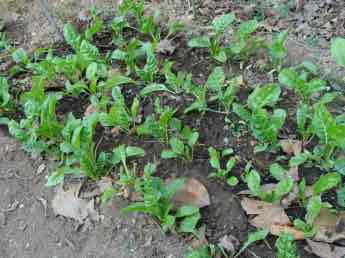
This page was last updated by Bernard Preston on 18th January, 2023.
Keep planting spinach every couple months and especially at the end
of summer if you value your Eggs Florentine. New research reveals that
some protein at every meal is what keeps the
dreaded loss of muscle-bulk seen in so many elderly folk at bay; and regular exercise too obviously.
Eggs were banned for decades by heart associations but are once again back in vogue; refined carbs are in fact the chief source of raised cholesterol. Enjoyed with dark-green leafy vegetables, the produce from your hens makes a sublime meal from the winter garden.
But you may be worried about your cholesterol, so combining eggs with spinach is the way to go. Popeye was not such a freak; he had much less arthritis because of the magnesium in his organic greens. Water the plants daily if the weather is dry.
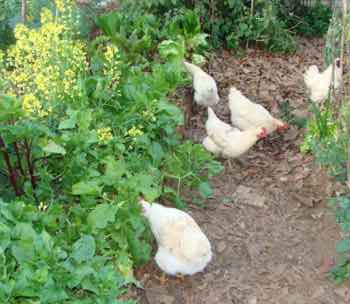 Free-range eggs and spinach make a wonderful breakfast.
Free-range eggs and spinach make a wonderful breakfast.Tidying up the garden
It is amazing how much can be achieved in one committed morning of collecting all the dry vegetable matter that is littering the yard. It's perhaps all a little mundane but those prunings from the flower garden, ginger leaves and dead hydrangea branches are perfect for the compost heap; and veggie patch too obviously.
A mountain of cauliflower stalks, dying pea plants and bolted lettuces can be turned into beautiful compost; and of course any still-unraked dead leaves that have fallen from the deciduous trees in your garden in winter.
It really is rather dull and boring; not time to invite friends to ooh and ah about what's
potting in the winter garden but vital and perfect material for making a compost pile. It's at the heart of organic vegetables.
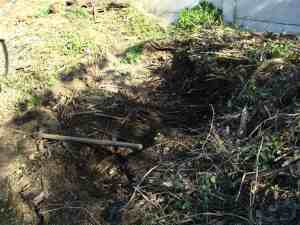
In just three to four months all that rough stubble will be rendered down to perfect black earthy goodness. It is all about nitrogen fixation bacteria in a well-aerated heap.
Used coffee grounds are excellent too but are a little acidic and need to be balanced with wood ash.
New plans
You will have your own new ideas germinating for your summer garden; vital, keep it exciting and stay focused. For me, this year it's more proper trellises for our beans and peas.
I have experimented the last decade with bamboo; it works perfectly but they only last two seasons. One good wind storm and it is "all fall down." I have grandchildren, you see so it is all about rings and roses; stabilise your trellises with a strong post planted deeply at each end.
So I have gone out and bought some steel fencing posts, stays and galvanised wire.
I have made four fences, two with steel posts, double the price, and two with treated timber poles. Metal stays are vital, otherwise the moment you tension the wires they will buckle.
Both will probably outlive me but if I were you I would go for the steel posts.
As
you can see there is too much shade in this bed, and along the fences
in this photo taken about three years ago. I've not cut that bamboo
right back, leaving enough to protect us from the African killer bees
just behind the bamboo when we are working in the veggie garden; but we have thinned the thicket further.
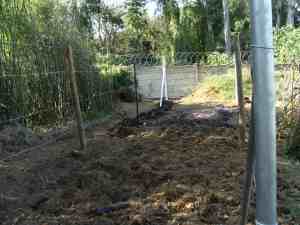
Enjoy all those winter vegetables
Which brings me to my next point. Trees, shrubs and this bamboo just keep growing taller. There comes a time, sooner rather than later when the chain saw and pruning tools must be put to work.
I have topped a cryptomeria that has grown beyond belief, and all this bamboo will be seriously shading the summer bean fences. It is hard work cutting back and digging out the roots.
If you suffer from heartburn, plant a susu; wonderful free food from the autumn and winter garden. They bear for months.
You can see in the middle of the above photo where I've started adding wheelbarrows of the humus from the summer compost pile. That too is hard physical work, but it keeps the body young, supple and strong; beats going to the gym. We have less injuries too. Mm, I am feeling a niggle between the shoulder blades.
Peas planted in the late summer should be fruiting now. I like two varieties of peas. These Sugar Snaps that you can eat whole in a salad, the grandchildren pick and chomp them in the garden, and Green Feast that are perfect for podding, though they rarely get to the pot. They are so sweet if eaten straight after you reap them.
Easy soup recipes
Winter is about delicious warm soups that fill the soul and the tum.
Nothing beats a bean soup, but fresh limas are something different. They have a very long growing season though. Canned they are often called butter beans though not nearly as nice.
Like all legumes they put nitrogen back into the soil, and provide us with a good vegetable protein source. I am as much a carnivore as anyone, but I do try to balance meat with plenty of beans, peas and lentils. There's a strong correlation between too much red meat and a host of diseases.
Green peas are a lot easier to grow; in our mild winters they do best from May to July. In summer they get mildew.

What's potting in the winter garden?
There's no potting in the winter garden in most of South Africa without water for irrigation. Luckily in most provinces it falls like manna from the heavens for those who make the effort to harvest and store it for the lean months.
But water scarcity in the whole world is becoming a very serious problem and ultimately will force all of us to reduce meat consumption; and to eat more legumes. They require one-tenth of that needed by animals to produce the same amount of protein.
"To feel at home, stay at home."
Clifton Fadiman.
It's at home where our green journey began some forty years ago but really only gaining momentum during the last decade.
What's potting in the winter garden is so important for those living in a mild climate. It is when the best greens grow; and hopefully lots of butternut and pumpkins to be stored up in the cellar. It is all about those phytochemicals that promote wellness and lessen the chance of dread disease; known as functional foods.
Now you can enjoy the fruit of your labours in summer. Every day, it is salad peas and dark-green leafy vegetables like lettuce and rocket; mint, young spinach leaves and radishes all from the garden.
And our famous authentic hummus recipe that I make twice a week. Two large spoonfuls make a salad, dribbled with freshly-squeezed lemon juice and extra virgin olive oil.
I have not seen the research but Jamie Oliver, the British cooking-celebrity, claims that greens need fat and an acid for absorption. I would agree and what's better than olive oil and lemon juice; or apple cider vinegar perhaps?
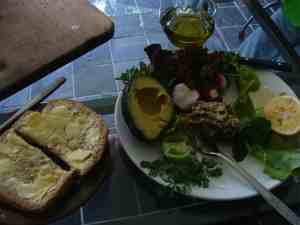
This is our lunch after potting in the winter garden this morning; there are plenty of organic greens, avocado and our easy to bake sourdough bread recipe; with plenty of butter, yes dairy is back, and margarine is definitely out.
Fresh lemon juice and olive oil are the sauces; avoid the inflammatory light corn, sunflower and Canola that are used in most of the supermarket condiments.
With all those cholesterol-lowering phytosterols you can afford to have a generous spread of butter on your bread, and still have disgustingly low triglycerides.
Ever consider why granny and grandpa lived well into their eighties despite full-cream milk, bacon and eggs, all before the days of margarine and Statin drugs? Assuming they did not smoke.
Even if you only have a small garden, do consider growing a lemon tree. Such a beautiful ornament when in flower and laden for months with delicious fruit; or a lime.
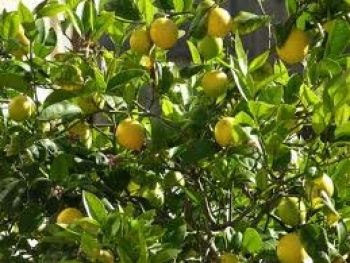
Perhaps it is time to consider planting other fruit trees; a peach? The fruit fats from the olive and avocado are not loaded with inflammatory PUFAs like seed oils are.
That means inflammation in the body; pain, and more visits to the DC and cardiologist. Rather consider avocado benefits straight from the garden. What's potting in the winter garden will include digging that hole for a fruit tree.

This is the Pinkerton avocado that we planted nearly three years ago; I see some flower buds forming for the first time. This basket is from our faithful Fuerte tree.
If you want to enjoy 20 avos a week,
like we do, now is the time to dig that hole and order your grafted tree.
Do not plant a pip; they take ten years to bear, and they grow
enormous. The fruit becomes very difficult to reap.
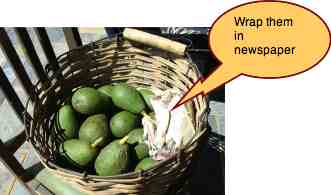
Use the Site Search function to find the links to those topics highlighted in bold.
Talking of fruit oils, only olives contain a proven anti-inflammatory phytochemical that will save your arteries and joints from becoming red hot.
Read about it at olive benefits; a good one burns at the back of the throat if you take a teaspoon neat. That is the oleocanthal[4].
Although I sprung a rib yesterday, perhaps a big sneeze last night, or carrying all those cuttings to the compost heap. Every breath gives me a little stab of pain between the shoulder blades, so I'm going to need treatment this morning from my daughter. It is useful having a DC in the family!
As I was saying, despite the rib, EVOO and a tablespoon of freshly ground flax seed every day means that I have very little inflammation in the body. Are you suffering from body aches, concerns about a heart condition and high blood pressure?
Think what's potting in the winter garden and get onto natural sources of anti-inflammatory omega 3, extra virgin olive oil and fatty fish; like this simple smoked salmon dip recipe is not rocket science.
More exercise, garden salads and fresh fruit is needed; and omega-3 too, read about it at flax seed nutrition information. Isn't that better than pain, disability and umpteen pills?
Newsletter
Our newsletter is entitled "create a cyan zone" at your home, preserving both yourself and Mother Earth for future generations; and the family too, of course. We promise not to spam you with daily emails promoting various products. You may get an occasional nudge to buy one of my books.
Here are the back issues.
- Lifestyle and ideal body weight
- What are ultra-processed foods?
- Investing in long-term health
- Diseases from plastic exposure
- Intensive lifestyle management for obesity has limited value
- A world largely devoid of Parkinson's Disease
- The impact of friendly bacteria in the tum on the prevention of cancer
- There's a hole in the bucket
- Everyone is talking about weight loss drugs
- Pull the sweet tooth
- If you suffer from heartburn plant a susu
- Refined maize meal and stunting
- Should agriculture and industry get priority for water and electricity?
- Nature is calling
- Mill your own flour
- Bake your own sourdough bread
- Microplastics from our water
- Alternative types of water storage
- Wear your clothes out
- Comfort foods
- Create a bee-friendly environment
- Go to bed slightly hungry
- Keep bees
- Blue zone folk are religious
- Reduce plastic waste
- Family is important
- What can go in compost?
- Grow broad beans for longevity
- Harvest and store sunshine
- Blue zone exercise
- Harvest and store your rainwater
- Create a cyan zone at your home
Dangers of anti-inflammatory drugs
That means none of the dangers of anti-inflammatory drugs; taken regularly they can cause a large hole in the stomach. Just last week, I had a new patient complaining of chronic lower back pain requiring NSAIDs every day for months; on questioning, "oh yes, I've just been to the doc because of some black blood in the stool."
Making a compost pile
Making a compost pile is a year-round business if you're a serious greenie, but never is this more true that in the winter garden; pruning the shrubs and roses, cutting back overgrowth of bushes that are shading their companions, and simply deceased lettuce, spinach and a host of summer vegetables. All are destined for either for your own humus or the dump. Which is it to be?
Making a compost pile is actually quite hard physical work; they are untidy beasts but they are at the heart of the green garden.
A short cut is the wonder of worm farms. Tossed into your compost pile they greatly speed up the process; and provide a fantastic liquid manure.
Consider too if you have the space, your own hens for free range eggs; then you'll have nutritious choice foods year-round and not just in winter.
Growing broccoli
Growing broccoli is really best in the cooler months; I like to plant it out in autumn so they can grow through the winter.
She the queen of the anti-tumour vegetables, so how to grow broccoli is a vital in our family.
It's all about a phytochemical called sulforaphane, vital in the methylation cycle to reduce inflammation; it is profoundly important for diabetics.
Legumes
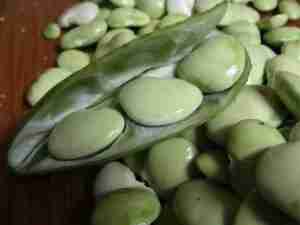
Green legumes all year-round is our goal but that was certainly impossible at what's potting in the winter garden in Chicago where we lived for four years. In our moderate climate in Hilton, South Africa, we are still enjoying the last of the limas in July and the broad beans are coming on strongly. Soon we will have fresh peas too.
Legumes are frowned upon if you are following a strict paleo or banting diet and perhaps that's right if you are diabetic or insulin-resistant. But for the rest of us that is not necessary as they do not produce a surge in blood glucose.
This weight loss research is very interesting. All diets are a complete waste of time; none of them deliver on their promises.
The WHO organisation has upped its warning from "possibly to probably" concerning red meat; I suspect that may not be true if grass-fed but that's extremely difficult to get in any case. It means more fish, fowl and legumes for protein.
How to plant broad beans makes vegetable-protein more readily available.
Fresh from the garden they are wonderful; after a week in the grocer
they are dreadful. Grow them yourself; they are also known as fava-beans. They are particularly important for those suffering from Parkinson's Disease[1].
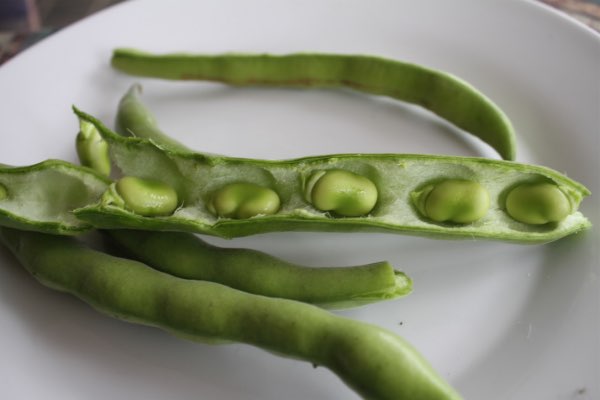 Young green fava beans in their pods.
Young green fava beans in their pods.It is certainly a rarity but the midwinter lightning and hail storm in 2020 did wonders for our garden, except for the tree that was struck; an awesome warning of the power and danger of nature.
Nutritious choice foods
Nutritious choice foods are part of a conscious decision that you'll do whatever is in your power to avoid getting a malignant tumour or dropping dead at fifty from a heart-attack.
There is indeed some remaining mystery about disease but an awful lot is known, and scientifically proven. Enjoy mushrooms to prevent prostate neoplasms, reduce your red meat to prevent breast tumours; and never take hormone replacement therapy unless you've had a total hysterectomy. Try to eat eight to ten coloured foods each day, without becoming neurotic about it.
Useful links
- Broad beans and Parkinson's disease research
- What is potting in the garden homepage...
- Organic food green.
- Oleocanthal. Web: https://tinyurl.com/munfyrm2
When browsing use right click and Open Link in New Tab, or you may get a bad gateway signal.
Did you find this page interesting? How about forwarding it to a friendly book or food junkie? Better still, a social media tick would help.
- Bernard Preston homepage
- What's potting?
- Whats Potting in the Winter Garden
Address:
56 Groenekloof Rd,
Hilton, KZN
South Africa
Website:
https://www.bernard-preston.com